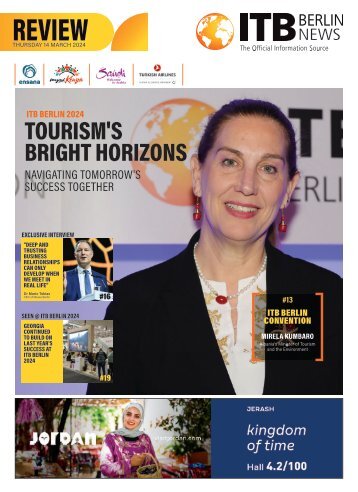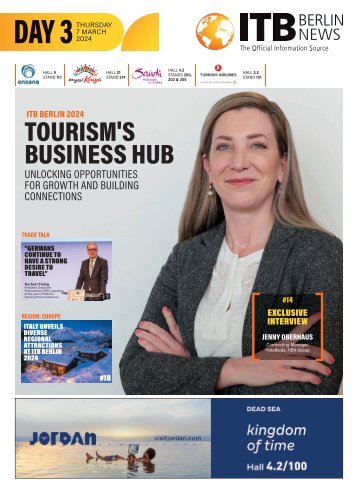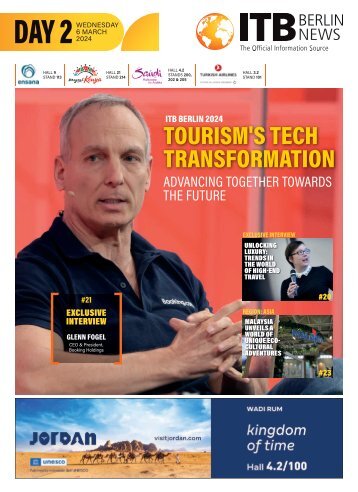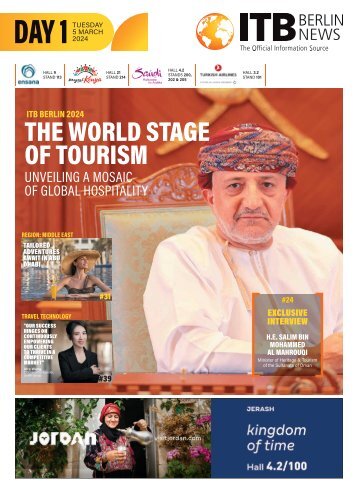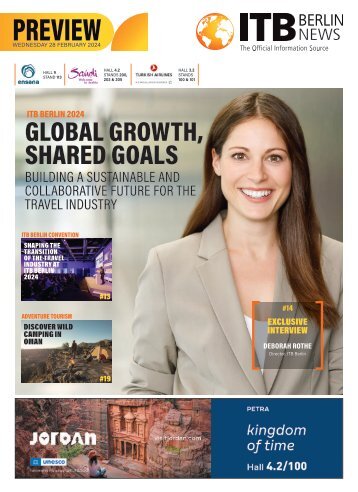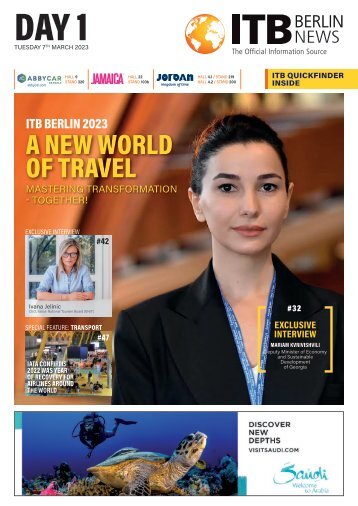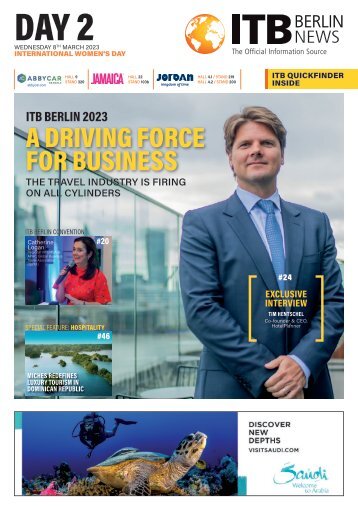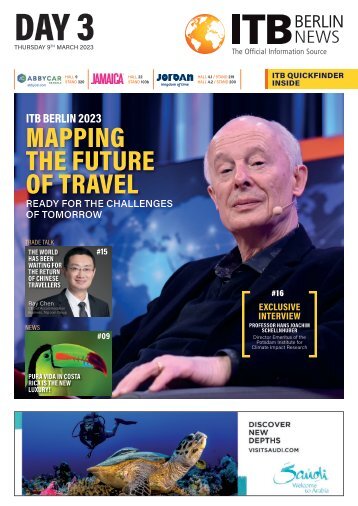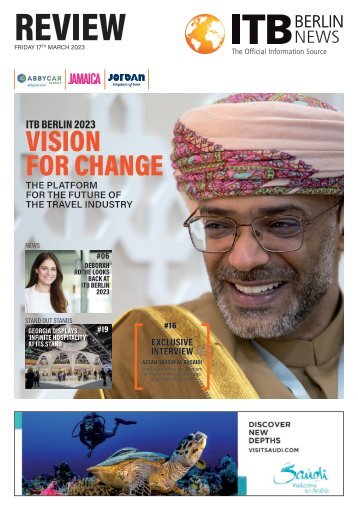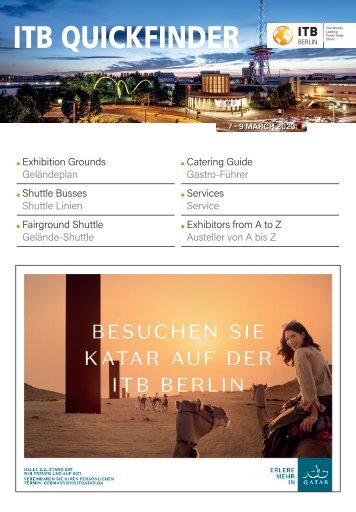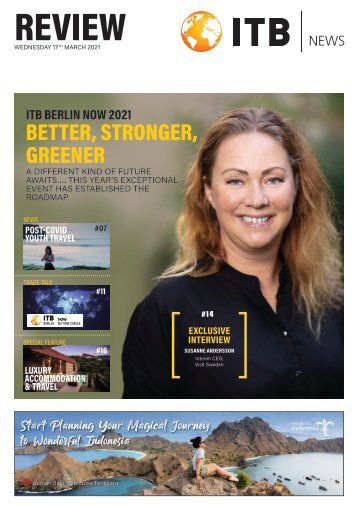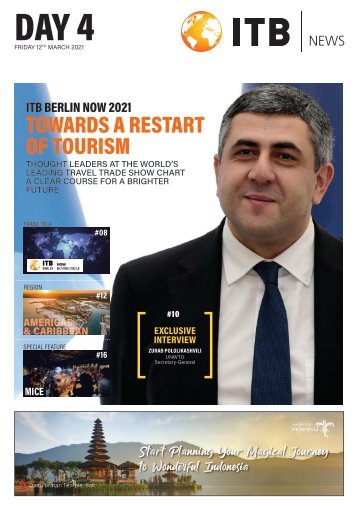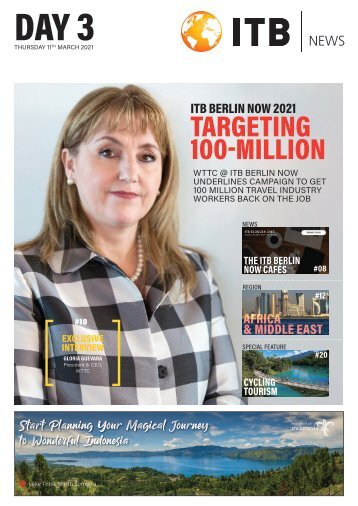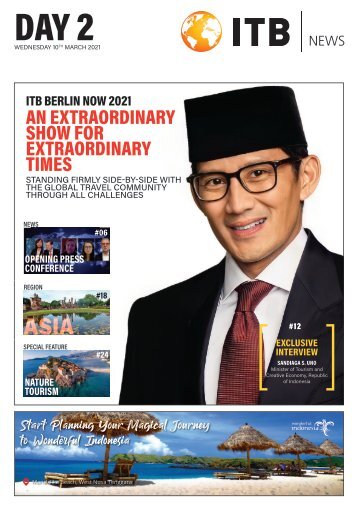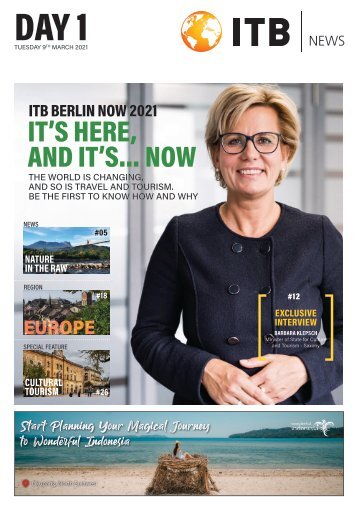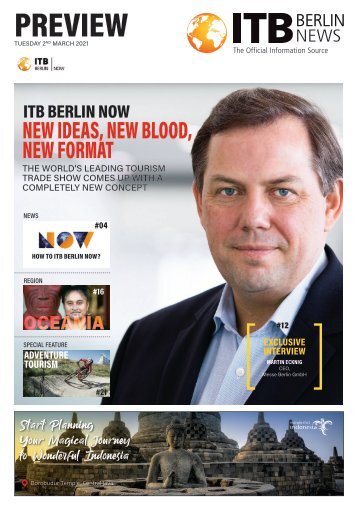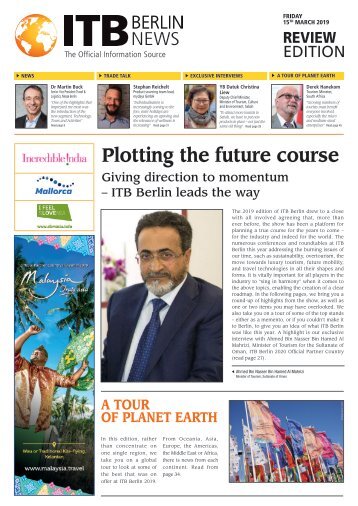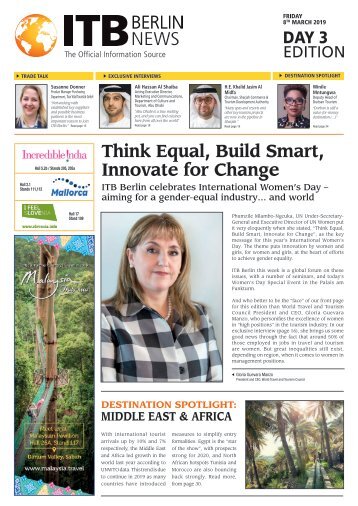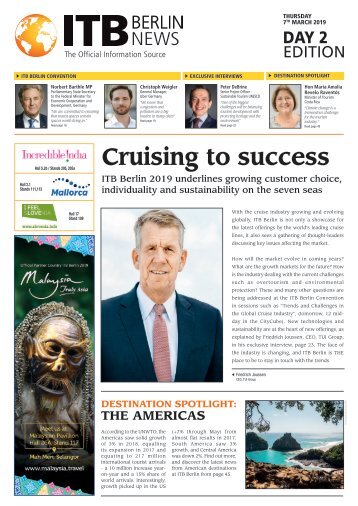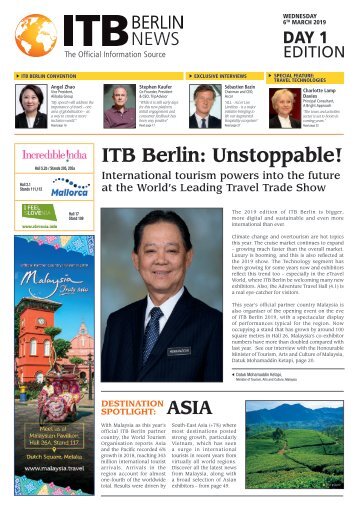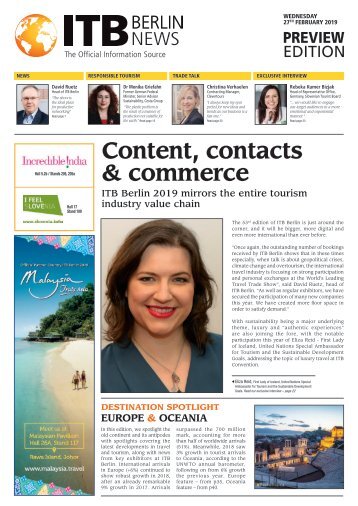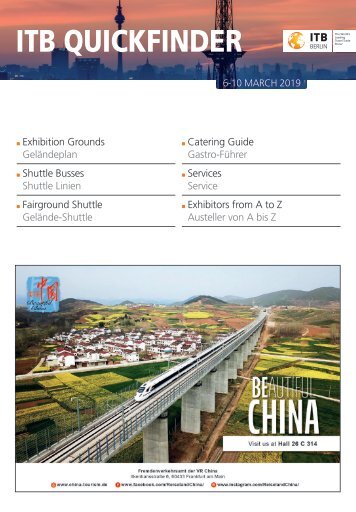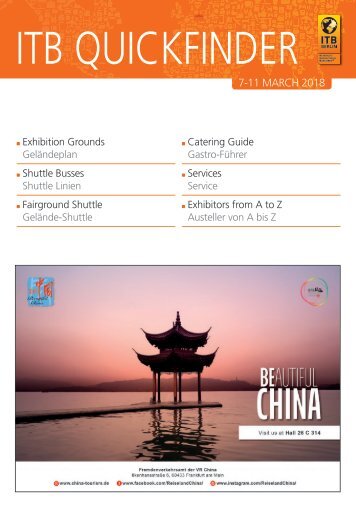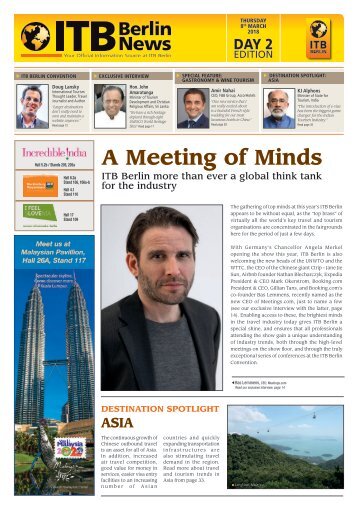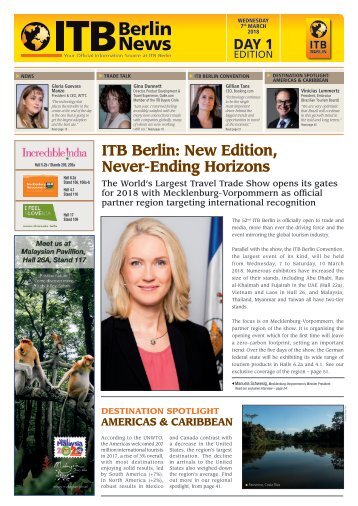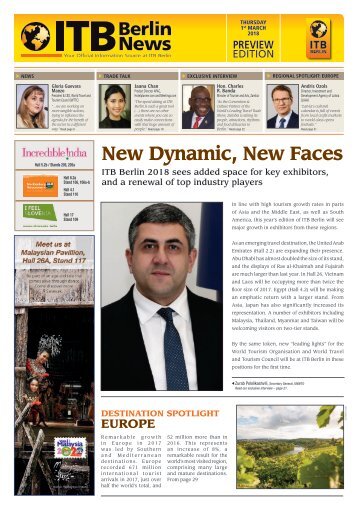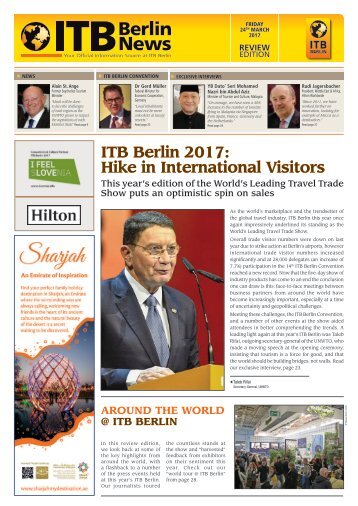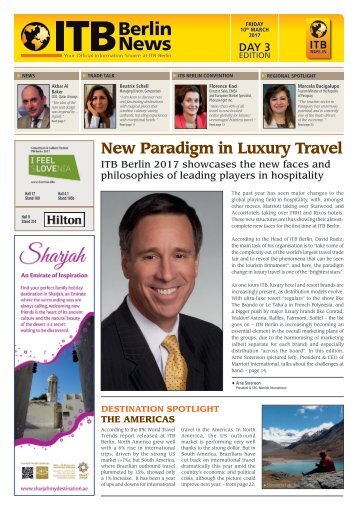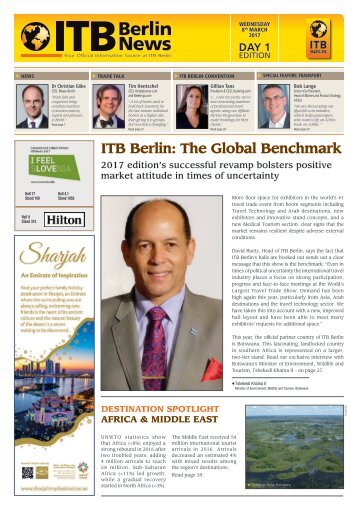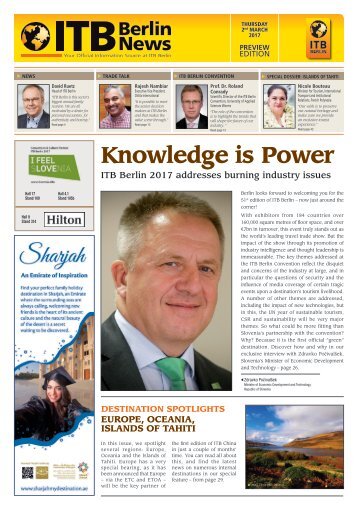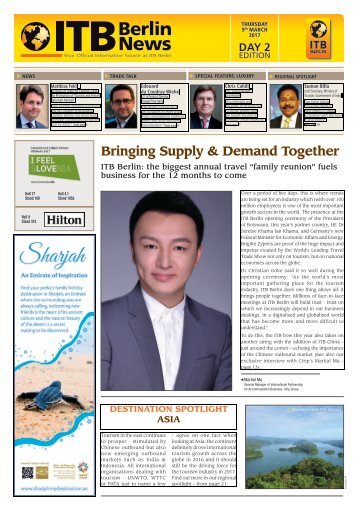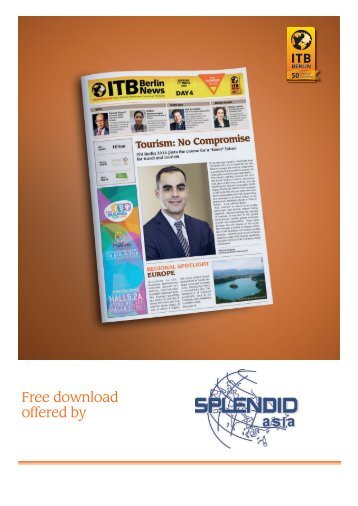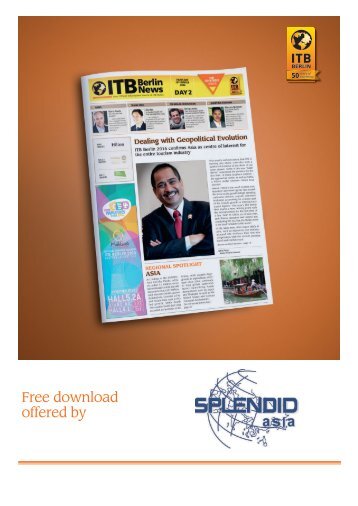
ITB Berlin News - Day 1
- Text
- Hotels
- Tourism
- Tours
- Resort
- Berlin
- Resorts
- Tourismus
- Halle
- Exhibitors
- Aussteller
6 NEWS Left to right:
6 NEWS Left to right: Framed by four Mongolian “traditional” hostesses, Dr Christian Göke, Messe Berlin CEO Dr Michael Frenzel, BTW President, H.E. Ms. Oyunkhorol Dulamsuren, Minister of Nature, Green Development, and Tourism Mongolia Norbert Fiebig, DRV President 49 th ITB Berlin “On a High” ITB Berlin is a strong marketplace in turbulent times The 49 th edition of ITB Berlin opens its gates as a “pillar of strength”, with exhibitor numbers on a high. At the event’s opening press conference on Tuesday 3 rd March, Dr Christian Göke, CEO of Messe Berlin said, “Our aim is to remain the most important trade fair of the industry”, citing pure turnover figures, with business volume of 6.5 bn Euros in 2014. Dr Göke said that one of the important factors in achieving this massive turnover was the ITB Buyers Circle, this year taking on new impetus with “speed dating”. “This will generate global business growth”, said Dr Göke. “There are now 850 hand selected buyers, and the objective for next year is to have the 1000 leading global buyers here at ITB Berlin. It’s THE global meeting point.” According to Dr Göke, “ITB Berlin is a strong marketplace and provides the international travel industry with an ideal platform for negotiating and doing business. In turbulent times and against the backdrop of a weak euro and uncertainty in the wake of terrorism and worldwide conflicts this is a particularly valuable and important aspect.” From 4 to 8 March 2015, on a display area covering 26 halls, 10,096 exhibitors from 186 countries will be offering visitors a representative overview of travel products and services from around the world, with highlights from growthintensive niche markets. More than two-thirds of the exhibitors showcasing their products and services in the 26 halls on the Berlin Exhibition Grounds are from abroad. Overall, more than 100,000 trade visitors are expected to attend the world’s largest travel trade show. A key focus is on Mongolia, the official partner country of the show. In Hall 26c, on an area occupying twice that of last year’s event, 30 exhibitors from Mongolia will have information about their products and services and in Hall 4.1 will be exhibiting sustainable tourism products. In a large yurt at the southern entrance to the show Mongolian hospitality awaits visitors to ITB Berlin. H.E. Ms. Oyunkhorol Dulamsuren, Minister of Nature, Green Development, and Tourism Mongolia spoke at the opening press event, saying that she was “truly grateful that Mongolia was chosen as partner country”. The minister outlined her country’s plans for sustainable growth, and said tourism was an important part of this. Mongolia, said Minister Dulamsuren, is currently ranked 99th in the world in terms of tourism competitiveness. The national development policy now puts forward tourism as a leading national industry, and the aim is to develop this - in the framework of publicprivate partnership, and advance Mongolia’s competitiveness ranking to 80th place by 2020. The Minister added that a new major airport will be opened in the nation’s capital Ulan Bator, in 2017, and among other targets, the number of Russian tourists visiting Mongolia is set to double over coming years. Dr Michael Frenzel President of the German tourism organisation, BTW, also spoke at the opening conference, saying conditions in this country were propitious for tourism growth, thanks to a stable economic situation and a readiness of the public to travel; However Dr Frenzel said that the state tended to see tourism as a “treasure chest” to be plundered through taxes and levies, and cited the fact that the German government may start introducing toll roads, which would have a ITB BERLIN NEWS • Wednesday 4 th March 2015 www.itb-berlin-news.com
NEWS 7 negative effect on tourism. He mentioned that while turnover is very high, profits are low, and taxes can in this sense could become unsustainable. Dr Frenzel called for a lowering – or even a ban of Germany’s current aviation levy, 50% of which is funded by German airlines. He cited this as a key reason for lagging growth in the aviation sector in Germany (with a rise of only around 3% last year). Another important factor in improving the industry scenario, he said, is the cutting of red tape: “We are affected by too much bureaucracy,” said Dr Frenzel. “Over nine billion Euros is wasted in bureaucracy in Germany each year.” On the bright side, he said that some on the political side are now are looking at how to reduce this red tape, but stressed there was also a need for a higher degree of flexibility concerning the way travel and tourism companies can employ personnel. A further challenge for members of his industry, said Dr Frenzel, is the sharing economy (one of the key topics of the ITB Belrin Convention this year): “Digital trends can’t be stopped by bans or impositions, but there needs to be a level playing field. We need to have a balanced form of competition.” VALUABLE FIRST-HAND INFORMATION TO BE FOUND AT ITB BERLIN CONVENTION The ITB Convention has now established itself as an important place for obtaining knowledge. This year’s programme features four surveys that were commissioned specifically for ITB Berlin. In an exclusive empirical survey Travelzoo and ITB Berlin investigated consumer price awareness and discovered that for 60 per cent of Germans the holiday experience took priority ahead of the cost. More than 5,000 potential interviewees in North America, China, Germany, the UK, France and Spain were asked about their holiday preferences. Results showed that among wellness tourists the holiday experience had priority, whereas price considerations more often had to do with transport. At the ITB Marketing and Distribution Day Richard Singer, managing director of Europe Travelzoo, will be commenting the findings and offering advice on how to maximise profits in the travel industry. The sharing economy meanwhile will be a key topic at the ITB Berlin Convention, where seven events will be highlighting the challenges and the prospects for the tourism industry. The ITB Future Day will be debating the future of commercial aviation and of the online travel market. At the numerous ITB Hospitality Day sessions, experts will be highlighting the security problems that hotel managers must look out for and looking at the lifestyle experience that budget and luxury hotels have to offer. This year the ITB Hospitality Day celebrates its tenth anniversary. At the ITB Destination Days Mongolia, the partner country of the show, will be highlighting the potential of market niche tourism. At the ITB Marketing and Distribution Day, Caroline Bremner, head of Travel Euromonitor International, will be speaking about the latest trends and the prospects for the sharing economy. In 2013, global private rentals amounted to 39 billion dollars. Between 2013 and 2018 this figure is expected to increase by 19 per cent, reaching 46 billion dollars in 2018. These figures include both formal rentals (such as Airbnb and HomeAway) and informal rentals such as locally organised private stays. Technical innovations such as secure online payment methods and geopositioning applications have helped to increase their popularity. Generation Y is among the main target audiences, while more and more older people are making use of the services offered by Airbnb and Uber. In some countries legal aspects may represent an obstacle to more widespread use of the sharing economy. DEBUT FOR THE WORLD LEGACY AWARDS At ITB Berlin 2015 corporate social responsibility and socially responsible tourism will again be key topics. For the first time the spotlight will be on tour operators, touring organisations and destinations that drive global change in the travel industry on the basis of sustainable tourism principles and practices. In cooperation with National Geographic ITB Berlin will be honouring the best projects by presenting the newly conceived World Legacy Awards. The awards will be presented in five categories: Earth Changers, Sense of Place, Conserving the Natural World, Engaging Communities and Destination Leadership. In Hall 4.1 (Adventure Travel & Responsible Tourism) and at the ITB CSR Day the focus will be on the topics of sustainability and human rights. Furthermore, this year ITB Berlin is due to sign the UNWTO Global Code of Ethics. As the world’s leading travel trade show ITB Berlin has campaigned for many years to embed and promote the principle of social and ecological responsibility in the international travel industry. In that context, over the years it has successfully built up the LGBT segment which is now among those expanding fastest at ITB Berlin. The Gay & Lesbian Travel Pavilion at ITB Berlin is the world’s largest LGBT platform and this year will feature numerous first-time exhibitors. TRAVEL TECHNOLOGY IS DRIVING THE INDUSTRY FORWARD Travel Technology is also expanding. It is one of the world’s largest displays and attracts a bigger international audience than at any other show. Around 30 newcomers and more than 170 companies will be showcasing their latest products. Among those exhibiting for the first time are Baidu, a search engine from China as large as Google, and Qunar, one of the country’s biggest booking platforms. In particular, Travel Technology is attracting a growing number of international exhibitors. In addition to companies from China, others from the UK (Intuitive Systems, Hotel Room Auction), Finland (Frosmo), India (Travel BPO, Moxiter), France (Flatswire) and Turkey (Yield Planet) have also secured floor space at the show. Furthermore, a number of Italian travel start-ups will be occupying a combined display under the heading of ’Start Up Italia’. ITB BERLIN NEWS • Wednesday 4 th March 2015
- Page 1: WEDNESDAY 4 th MARCH 2015 ITB QUICK
- Page 8: 8 TRADE TALK Sharing a Passion for
- Page 11: ITB BERLIN CONVENTION 11 Stakes for
- Page 15 and 16: TRANSPORT SPECIAL FEATURE 15 After
- Page 18 and 19: 18 SPECIAL FEATURE ADVERTORIAL TRAN
- Page 20 and 21: 20 SPECIAL FEATURE ADVERTORIAL TRAN
- Page 22 and 23: 22 SPECIAL FEATURE TRAVEL TECHNOLOG
- Page 24 and 25: 24 SPECIAL FEATURE TRAVEL TECHNOLOG
- Page 26 and 27: 26 SPECIAL FEATURE CITY BREAKS MICE
- Page 28 and 29: 28 SPECIAL FEATURE ADVERTORIAL CITY
- Page 30 and 31: 30 SPECIAL FEATURE ADVERTORIAL CITY
- Page 32 and 33: 32 REGION ASIA The “Great Empire
- Page 34 and 35: 34 REGION ASIA It’s the Human Val
- Page 37: ASIA REGION 37 Accor - One New Hote
- Page 41 and 42: ASIA REGION 41 TVoA - a Game Change
- Page 43 and 44: ADVERTORIAL ASIA REGION 43 KERAMA I
- Page 45 and 46: 45 HOSPITALITY / RESTAURANTS / BARS
- Page 49 and 50: ITB QUICKFINDER 4-8 MARCH 2015 Exhi
- Page 51 and 52: Hall 26 A / Stand 131 Hall 26 A / S
- Page 53 and 54: CATERING GUIDE & OPEN EXITS EVENING
- Page 55 and 56: EXHIBITORS FROM A TO Z AUSTELLER VO
- Page 57 and 58:
A / B EXHIBITORS / AUSSTELLER HALL
- Page 59 and 60:
B / C EXHIBITORS / AUSSTELLER HALL
- Page 62 and 63:
EXHIBITORS FROM A TO Z AUSTELLER VO
- Page 64 and 65:
EXHIBITORS FROM A TO Z AUSTELLER VO
- Page 66 and 67:
EXHIBITORS FROM A TO Z AUSTELLER VO
- Page 68 and 69:
EXHIBITORS FROM A TO Z AUSTELLER VO
- Page 70 and 71:
EXHIBITORS FROM A TO Z AUSTELLER VO
- Page 72 and 73:
EXHIBITORS FROM A TO Z AUSTELLER VO
- Page 74 and 75:
EXHIBITORS FROM A TO Z AUSTELLER VO
- Page 76 and 77:
EXHIBITORS FROM A TO Z AUSTELLER VO
- Page 78 and 79:
EXHIBITORS FROM A TO Z AUSTELLER VO
- Page 80:
EXHIBITORS FROM A TO Z AUSTELLER VO
Inappropriate
Loading...
Mail this publication
Loading...
Embed
Loading...
